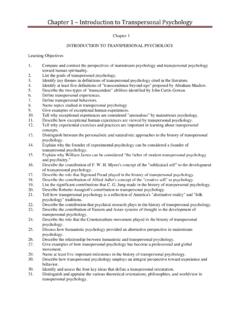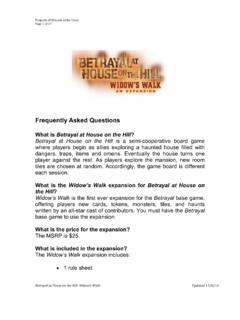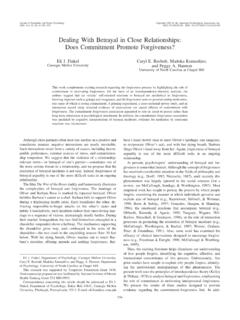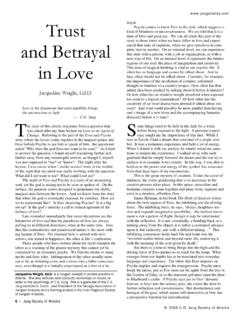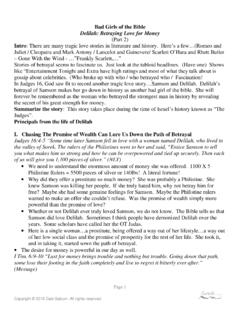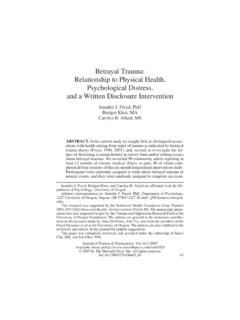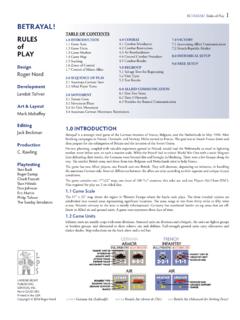Transcription of Self -trust within trust betrayal: the whistleblower
1 Self -trust within trust - betrayal : the whistleblower Lloyd J. Carr Philosophy Department Rivier University Nashua, NH 03060. Website: Abstract: This paper explores the role of self -trust in a situation in which an autonomous agent is a whistleblower and by blowing the whistle is betraying the trust of others. The paper is organized into three main sections. In the first section I construct a realistic whistleblowing/ trust - betrayal scenario in which the agent intentionally both blows the whistle and betrays trust , but in doing so confronts challenges and conflicts at key points. Using four examples of an agent in a position of trust : in a family business, in a military combat unit, in an internship position, and in an academic program, I give the agent reasons to become a whistleblower ; I also give the agent equal conflicting reasons not to betray the trust she has been given trust that blowing the whistle will betray. In the second section I suggest two necessary conditions for trust - betrayal : (i) that, in a full trust relationship in which a trustor trusts a trustee to do an action, and in which the trustor believes the trustee to be relevantly trustworthy to do that action, the betrayer occupies the position of trustee and (ii) that the trustor in this full trust -relationship does not believe the trustee will betray that trust .
2 In the third section, I argue that self -trust operates at both the intention-forming and the actional stages to keep the agent on-track, so that an overall consistent unit of agency results. Self -trust is shown to operate positively with respect to the agent's capability to be responsive to reasons the agent has to blow the whistle, and shown to operate negatively with respect to the agent's capability to be unresponsive to reasons the agent has to remain trustworthy. We see that the agent, in trusting herself in this whistleblowing/ trust - betrayal unit of agency, does not permit her reasons to remain trustworthy and not betray trust to win out over her reasons to blow the whistle. I next contrast self -trust with a standard conception of self-control and argue that the former, but not the latter, is needed if this unit of agency is to be completed. Finally, I argue that intrapersonal trust can operate on behalf of interpersonal trust - betrayal ( in the context of whistleblowing) in a morally neutral way, such that independent moral analysis is needed to evaluate the moral status of the initial trust , the self -trust , and the trust - betrayal .
3 Keywords: trust , Self -trust , trust - betrayal , Intention, Whistleblowing, Practical agency, Autonomy 1. 1. Setting up the problem: It is widely accepted within the literature on trust that trusting other human agents leaves the trustor open to the possibility of betrayal by the Vulnerability to betrayal is a more troubling aspect of trusting others than the risk that one's trust is disappointed or let down, for betrayal is an intentional violation of trust that takes advantage of trust for its success. trust - betrayal implies a degree of autonomy and perhaps planning on the part of the trusted; it typically involves a recognition of the potential damage it will do to the trustor and to the future of the trust relationship (indeed, for high- stakes trust relationships betrayal could make future trust impossible), whereas other ways that a trust relationship might be broken need not involve such intention, recognition of damage, or autonomy on the part of the trusted.
4 In letting someone's trust down, the trusted might well be excused perhaps herself a victim of circumstances or otherwise passive in being relatively not trustable. For example, where person S trusts person T to , and T in turn trusts institution I to , T might disappoint S's trust by failing to because I let T's trust down by failing to . In such a case there is no basis for S to claim that T betrayed S's trust , for T would not have been an agent in letting S's trust down but more a victim in so far as fulfilling S's trust depended on I's 'ing. By requiring that trust - betrayal be intentional, trust - betrayal is necessarily agential. Two distinctions will help set up the problem I wish to explore. trust - betrayal is epistemic if it takes place between epistemic agents, for example in the area of beliefs and the exchange of information. So, where S and T are members of a pharmaceutical research team and S trusts T to provide accurate information concerning a drug experiment, T epistemically betrays S's trust by intentionally distorting experimental data in an effort to give S false beliefs about the drug in question (even if that effort fails).
5 trust - betrayal is practical if it takes place between practical agents in the area of decision and action. I. take the distinction between epistemic and practical trust , and between epistemic and practical trust - betrayal , to be an application to the case of trust of the general distinction between epistemic and practical I will restrict the type of trust - betrayal I wish to explore to practical agency. The second distinction that helps bring the problem into focus is that between the form of practical agency involving self -trust and the form that does We can think of a typical unit of practical agency as an agent moving through three stages, each next based on the previous stage: where = an action or a course-of-action, the agent moves from an initial desire to or forming a judgment that she should , to forming an intention or decision to , and finally to fulfilling the intention by ' In some units of practical agency these transitions do not present the agent with inner challenge, difficulty, or conflict.
6 The agent has no reason to stop or desire to give up; such units happen, as it were, effortlessly and there is no point at which self -trust (or self-distrust) has occasion to operate. Perhaps 'ing is something the agent routinely does, or is an action the agent has practiced to the point of high skill-acquisition, or is simply something everyone does as a matter of daily living. So, for example, we don't normally see the need for self -trust in ordinary hygiene activity such as washing your hands or brushing your teeth even though these (often) count as full units of practical agency in which an agent must transition from judgment or desire to intention and then to action. 2. In contrast, there are units of practical agency that contain inner challenge and resistance such that an agent requires, to make the transitions from judgment to intention to action, a relation of trust and trustworthiness between her earlier and her later stages of agency.
7 An agent might desire to or might judge it best (all things considered) to and then struggle with herself; the agent might experience volitional resistance and conflict, wavering or indecisiveness when it comes to forming an intention to . Or an agent might form an intention to but then experience weakness, conflict, lingering doubts and uncertainty, loss of nerve, the appeal of reasons to hold back, temptations to give up, or otherwise find it difficult to get herself to act on that intention when the time Such units of agency, if the agent is to accomplish them, require reasonable self -trust , the justified self-attribution that I can and should trust myself with respect to 'ing, and that I am trustworthy with respect to exercising the capability needed to act on the intention to . In forming an intention to do what the agent desires or thinks it best to do, an agent in trusting herself justifiably believes that with respect to carrying out her plan she is trustworthy in certain capabilities to overcome hesitation and weaknesses, and to resist temptations not to follow through.
8 And, in order to consider herself rationally bound to act on her intention when the moment to act has arrived, the agent must justifiably believe her intention-forming self to have been trustworthy in accepting the prior desire or judgment as the basis on which to form an intention, and trustworthy in reasonable risk-taking and foresight. Self -trust in such challenging cases of practical agency operates as a layer of practical rationality that helps see the agent through the point of forming an intention to and then through the point of acting on that intention, given a prior desire to or a judgment that the best thing to do is to . The unit of practical agency requiring self -trust I wish to explore is that of betraying another's trust . Betraying a person's or an institution's trust is not, I will assume, an easy thing for an agent to do. For the case I have in mind, the transitions from (i) a judgment, perhaps accompanied by a desire, that betrayal (all things considered) is what the agent should do, to (ii) forming an intention to betray the trust that has been given to and fulfilled by the agent, and then (iii) acting on that intention such that the action is (also, if not primarily) an instance of trust - betrayal , will be difficult for the agent, containing challenges, temptations to give up and reasons not to follow through.
9 trust - betrayal , we will see, requires the belief that a particular capability or inner strength is required with regard to which the agent normatively expects herself trustworthy in its exercise. My focus, then, is not on the moral evaluation of trust - betrayal (which could be a good or a bad thing depending on the situation), and it is not on the agent's question, Should I betray the trust I have been given? I will assume that the cognitive stage of this unit of agency has been concluded: in epistemically non-biased and thorough deliberations, the agent has worked through the reasons for and against and has overcome any conceptual challenge there might have been in betraying trust and has come to an all-things- considered judgment that The best thing for me to do is betray the trust I have been given. The agent now subjectively knows what she should do. Instead, my interest is on the volitional and actional stages of the unit of agency that come after deliberations have been completed and settled; I want to focus specifically on the role of self -trust as a rational constraint that keeps an agent from backing down when it comes to forming an intention and then when it comes to acting on that intention, given that the agent has strong motivation in the form of compelling reasons not to betray the trust that the agent has, prior to betrayal , accepted and with regard to which proven to be trustworthy.
10 3. It might be claimed at this point that no one ever judges trust - betrayal as the all-things-considered best thing to do, and surely no one ever desires to betray the trust they have been given. And, to the degree that the intention to do something is founded on the agent's prior judgment that doing it is what the agent should do (or founded on a prior desire to do it), this would imply that no one ever intends to betray trust . Something else must be going on such that trust - betrayal is an unavoidable means to an end or an anticipated but unintended consequence. I believe this view is false. I hope to show that in some situations trust - betrayal is so much a part of whatever else an agent might be trying to do that both judging that trust - betrayal ought to be done and then forming the intention to betray trust are not only possible but in a way uppermost in the agent's mind. The example I have in mind and will use as a model to explore the role of self -trust in trust - betrayal is that of the whistleblower .



